Abstract
Macrophages derived from the human monocyte cell line THP-1 or isolated from the peritoneum of C3H/HEJ mice were incubated with oxidized low-density lipoprotein (LDL) and the total glutathione content (oxidized plus reduced) was measured. An initial depletion of glutathione was followed by an increase, such that after a period of 24 h the glutathione content has approximately doubled. This response required the oxidation of the lipid phase of the LDL molecule, since both native LDL and acetylated LDL had little effect on glutathione levels. The response of the cells to oxidized LDL was dependent on the extent of oxidative modification of the protein. It was also found that 4-hydroxynonenal had a similar effect on THP-1 cells, and we suggest that this or other aldehydes present in oxidized LDL causes the induction of glutathione synthesis in response to an initial oxidative stress and consequent glutathione depletion. In addition, we found that both cell types possess transferases and peroxidases capable of detoxifying aldehydes and peroxides. However, treatment of cells with oxidized LDL or 4-hydroxynonenal for a period of 24 h had no effect on the activities of these enzymes.
Full text
PDF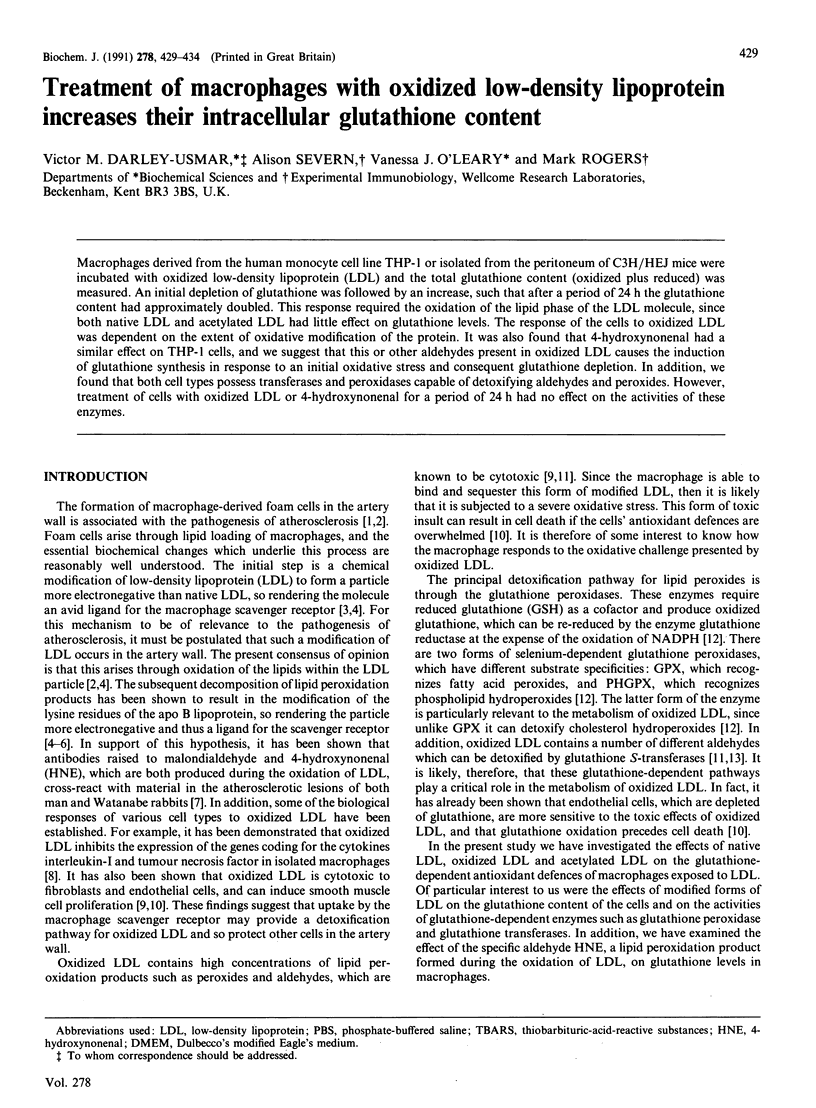
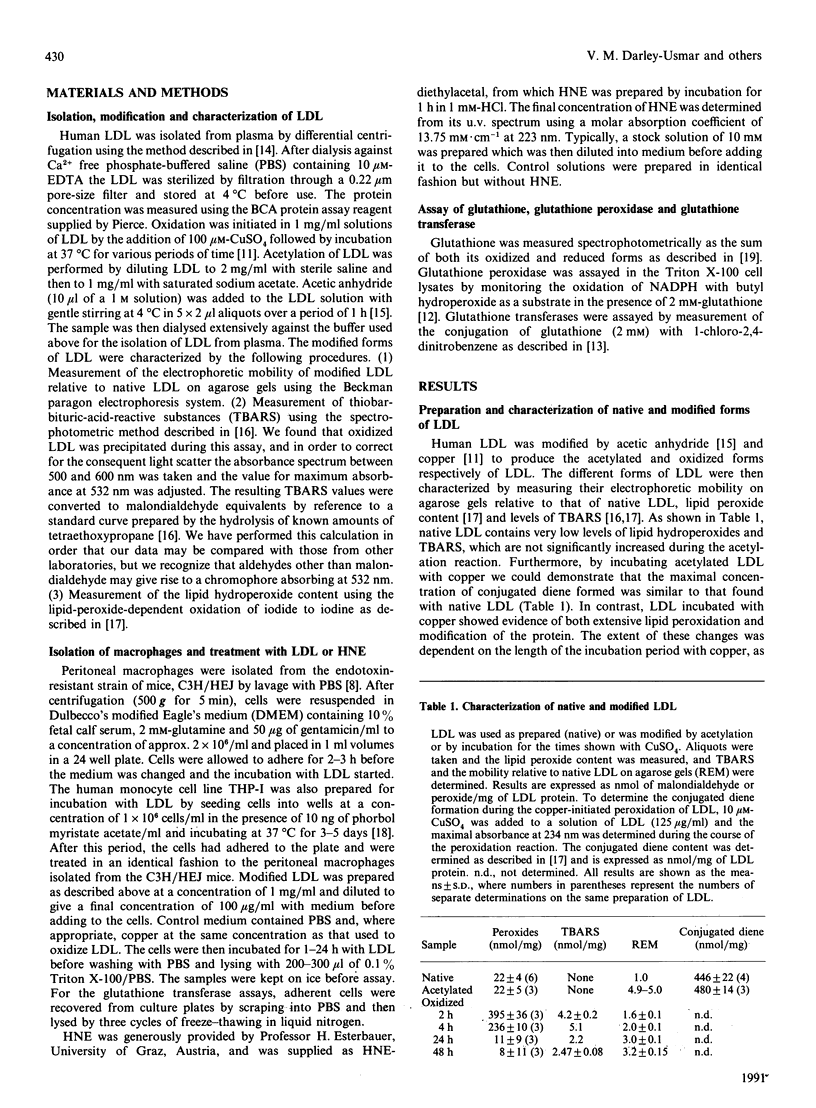
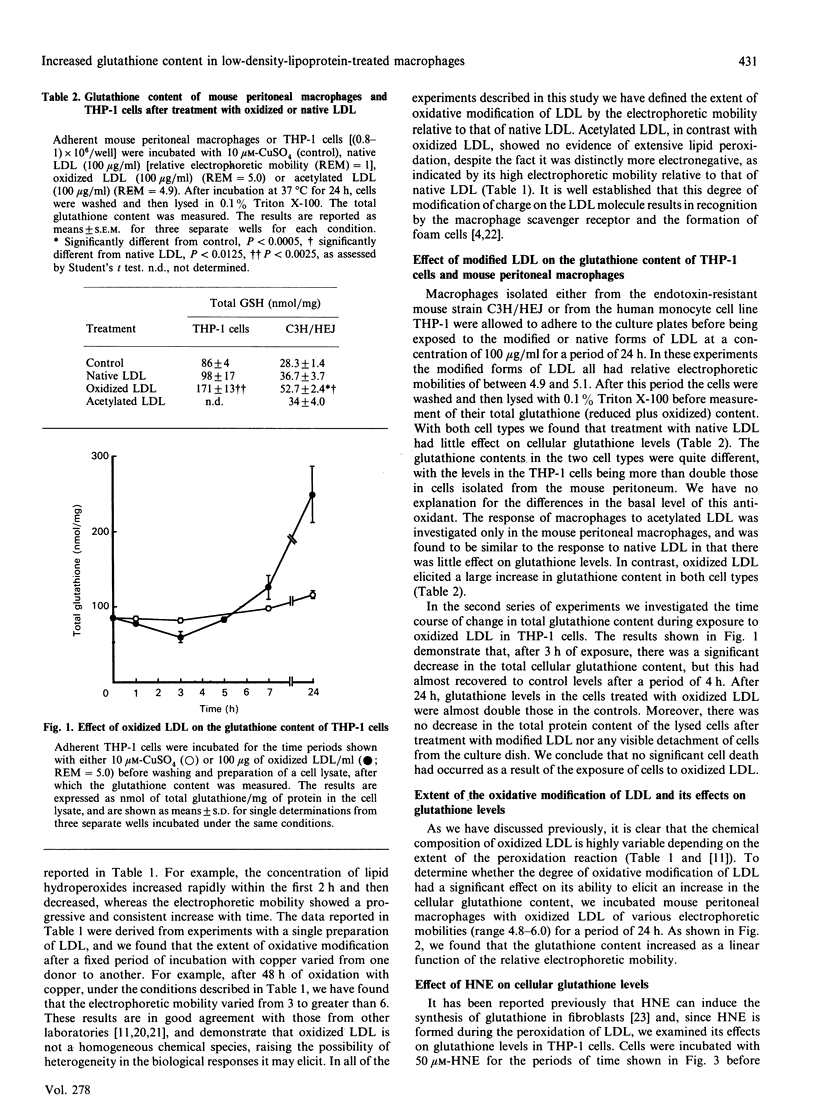
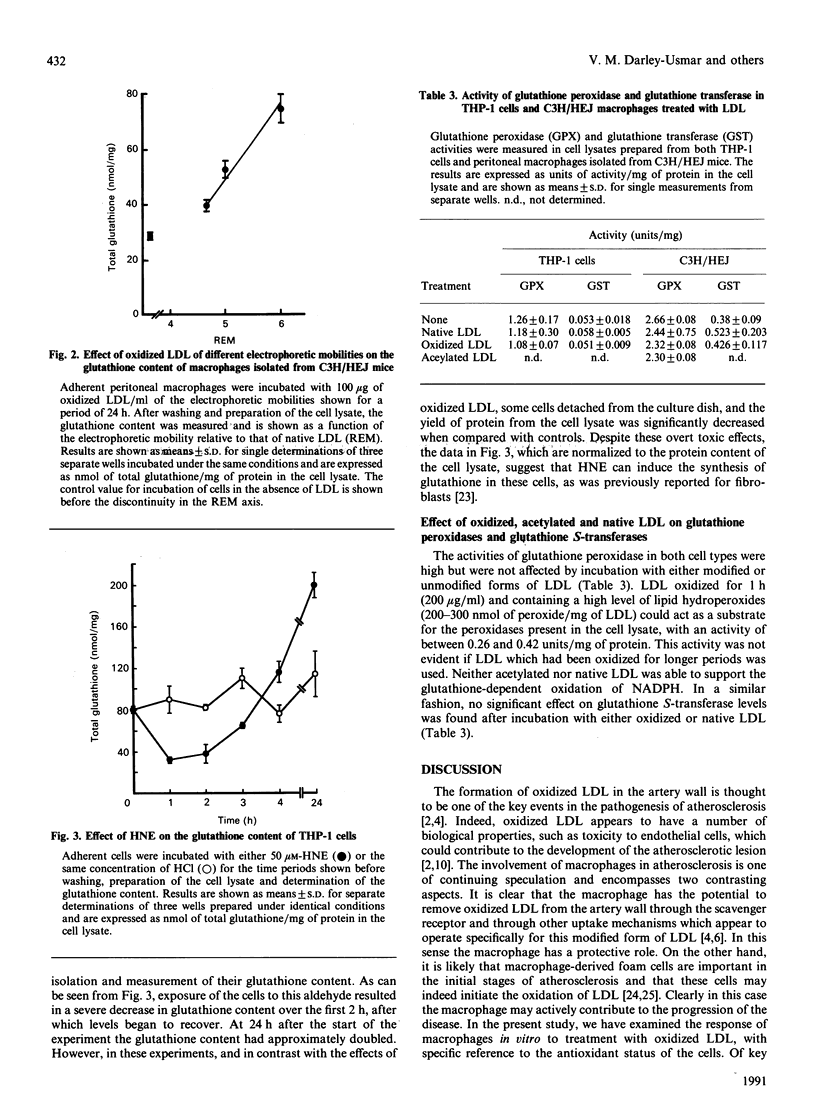
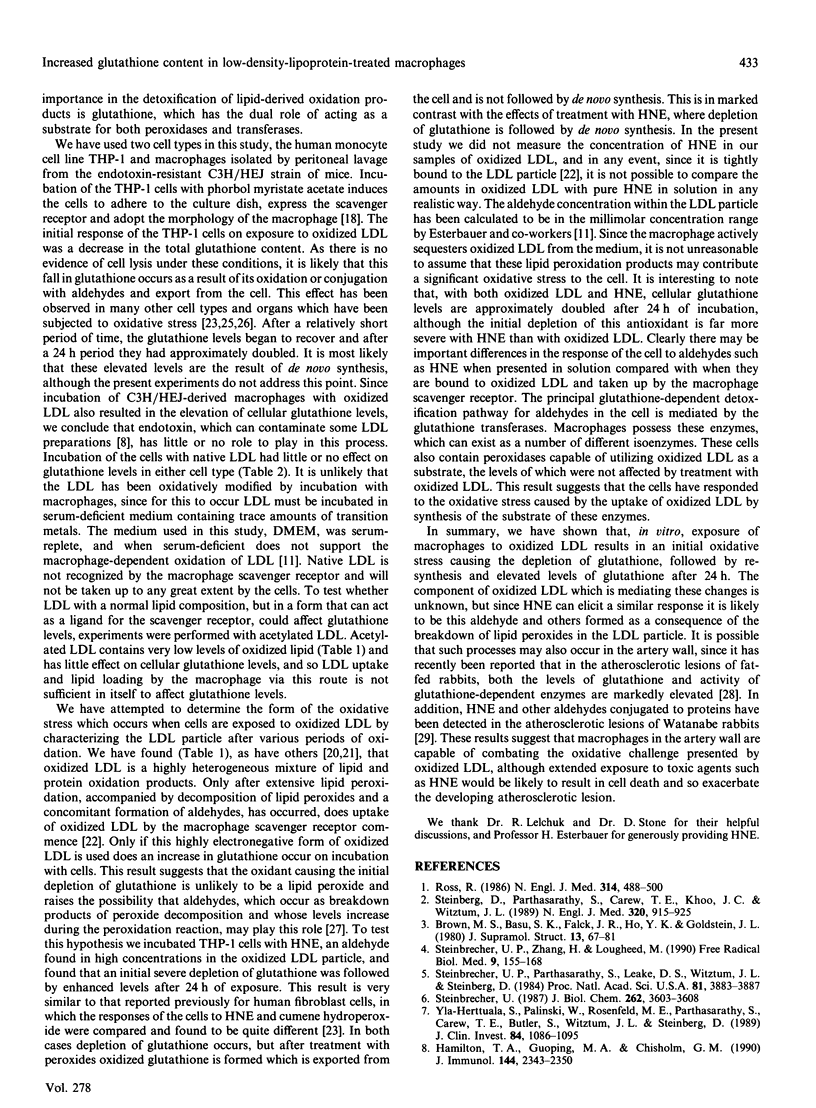
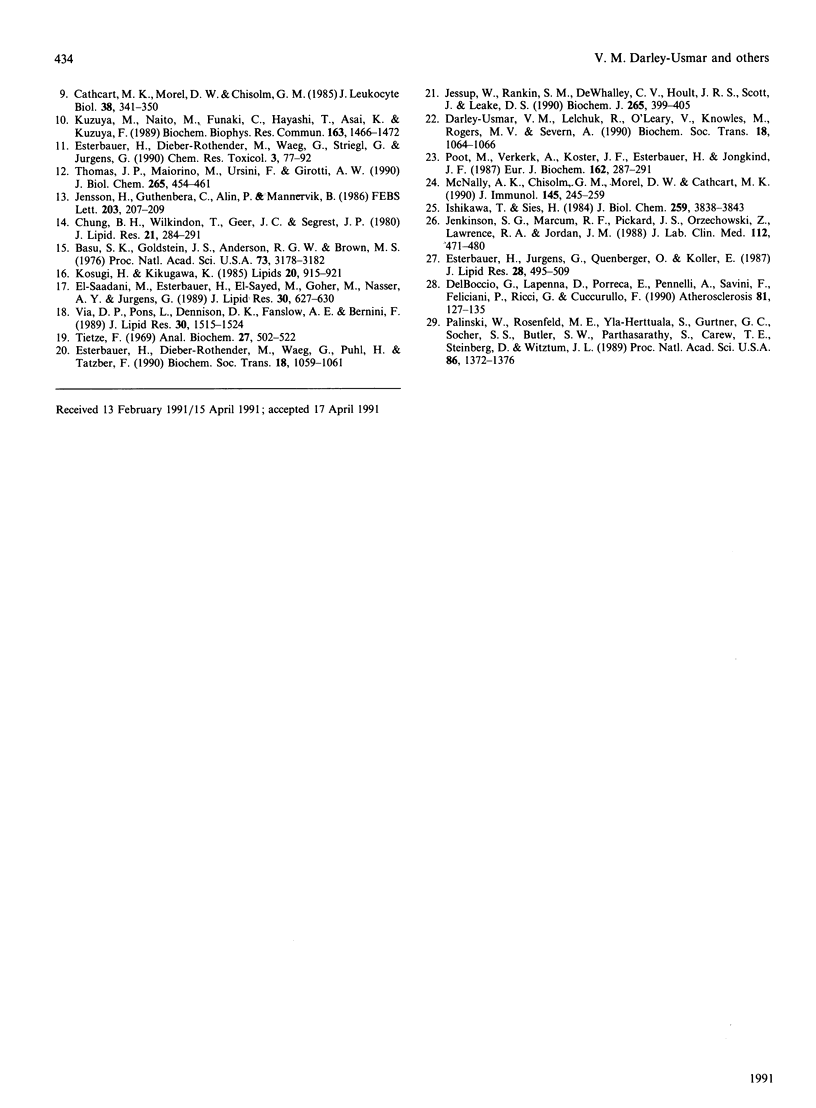
Selected References
These references are in PubMed. This may not be the complete list of references from this article.
- Basu S. K., Goldstein J. L., Anderson G. W., Brown M. S. Degradation of cationized low density lipoprotein and regulation of cholesterol metabolism in homozygous familial hypercholesterolemia fibroblasts. Proc Natl Acad Sci U S A. 1976 Sep;73(9):3178–3182. doi: 10.1073/pnas.73.9.3178. [DOI] [PMC free article] [PubMed] [Google Scholar]
- Brown M. S., Basu S. K., Falck J. R., Ho Y. K., Goldstein J. L. The scavenger cell pathway for lipoprotein degradation: specificity of the binding site that mediates the uptake of negatively-charged LDL by macrophages. J Supramol Struct. 1980;13(1):67–81. doi: 10.1002/jss.400130107. [DOI] [PubMed] [Google Scholar]
- Cathcart M. K., Morel D. W., Chisolm G. M., 3rd Monocytes and neutrophils oxidize low density lipoprotein making it cytotoxic. J Leukoc Biol. 1985 Aug;38(2):341–350. doi: 10.1002/jlb.38.2.341. [DOI] [PubMed] [Google Scholar]
- Chung B. H., Wilkinson T., Geer J. C., Segrest J. P. Preparative and quantitative isolation of plasma lipoproteins: rapid, single discontinuous density gradient ultracentrifugation in a vertical rotor. J Lipid Res. 1980 Mar;21(3):284–291. [PubMed] [Google Scholar]
- Darley-Usmar V. M., Lelchuk R., O'Leary V. J., Knowles M., Rogers M. V., Severn A. Oxidation of low-density lipoprotein and macrophage derived foam cells. Biochem Soc Trans. 1990 Dec;18(6):1064–1066. doi: 10.1042/bst0181064. [DOI] [PubMed] [Google Scholar]
- Del Boccio G., Lapenna D., Porreca E., Pennelli A., Savini F., Feliciani P., Ricci G., Cuccurullo F. Aortic antioxidant defence mechanisms: time-related changes in cholesterol-fed rabbits. Atherosclerosis. 1990 Mar;81(2):127–135. doi: 10.1016/0021-9150(90)90019-f. [DOI] [PubMed] [Google Scholar]
- Esterbauer H., Dieber-Rotheneder M., Waeg G., Puhl H., Tatzber F. Endogenous antioxidants and lipoprotein oxidation. Biochem Soc Trans. 1990 Dec;18(6):1059–1061. doi: 10.1042/bst0181059. [DOI] [PubMed] [Google Scholar]
- Esterbauer H., Dieber-Rotheneder M., Waeg G., Striegl G., Jürgens G. Biochemical, structural, and functional properties of oxidized low-density lipoprotein. Chem Res Toxicol. 1990 Mar-Apr;3(2):77–92. doi: 10.1021/tx00014a001. [DOI] [PubMed] [Google Scholar]
- Esterbauer H., Jürgens G., Quehenberger O., Koller E. Autoxidation of human low density lipoprotein: loss of polyunsaturated fatty acids and vitamin E and generation of aldehydes. J Lipid Res. 1987 May;28(5):495–509. [PubMed] [Google Scholar]
- Hamilton T. A., Ma G. P., Chisolm G. M. Oxidized low density lipoprotein suppresses the expression of tumor necrosis factor-alpha mRNA in stimulated murine peritoneal macrophages. J Immunol. 1990 Mar 15;144(6):2343–2350. [PubMed] [Google Scholar]
- Ishikawa T., Sies H. Cardiac transport of glutathione disulfide and S-conjugate. Studies with isolated perfused rat heart during hydroperoxide metabolism. J Biol Chem. 1984 Mar 25;259(6):3838–3843. [PubMed] [Google Scholar]
- Jenkinson S. G., Marcum R. F., Pickard J. S., Orzechowski Z., Lawrence R. A., Jordan J. M. Glutathione disulfide formation occurring during hypoxia and reoxygenation of rat lung. J Lab Clin Med. 1988 Oct;112(4):471–480. [PubMed] [Google Scholar]
- Jensson H., Guthenberg C., Alin P., Mannervik B. Rat glutathione transferase 8-8, an enzyme efficiently detoxifying 4-hydroxyalk-2-enals. FEBS Lett. 1986 Jul 28;203(2):207–209. doi: 10.1016/0014-5793(86)80743-8. [DOI] [PubMed] [Google Scholar]
- Jessup W., Rankin S. M., De Whalley C. V., Hoult J. R., Scott J., Leake D. S. Alpha-tocopherol consumption during low-density-lipoprotein oxidation. Biochem J. 1990 Jan 15;265(2):399–405. doi: 10.1042/bj2650399. [DOI] [PMC free article] [PubMed] [Google Scholar]
- Kuzuya M., Naito M., Funaki C., Hayashi T., Asai K., Kuzuya F. Protective role of intracellular glutathione against oxidized low density lipoprotein in cultured endothelial cells. Biochem Biophys Res Commun. 1989 Sep 29;163(3):1466–1472. doi: 10.1016/0006-291x(89)91144-3. [DOI] [PubMed] [Google Scholar]
- McNally A. K., Chisolm G. M., 3rd, Morel D. W., Cathcart M. K. Activated human monocytes oxidize low-density lipoprotein by a lipoxygenase-dependent pathway. J Immunol. 1990 Jul 1;145(1):254–259. [PubMed] [Google Scholar]
- Palinski W., Rosenfeld M. E., Ylä-Herttuala S., Gurtner G. C., Socher S. S., Butler S. W., Parthasarathy S., Carew T. E., Steinberg D., Witztum J. L. Low density lipoprotein undergoes oxidative modification in vivo. Proc Natl Acad Sci U S A. 1989 Feb;86(4):1372–1376. doi: 10.1073/pnas.86.4.1372. [DOI] [PMC free article] [PubMed] [Google Scholar]
- Poot M., Verkerk A., Koster J. F., Esterbauer H., Jongkind J. F. Influence of cumene hydroperoxide and 4-hydroxynonenal on the glutathione metabolism during in vitro ageing of human skin fibroblasts. Eur J Biochem. 1987 Jan 15;162(2):287–291. doi: 10.1111/j.1432-1033.1987.tb10598.x. [DOI] [PubMed] [Google Scholar]
- Ross R. The pathogenesis of atherosclerosis--an update. N Engl J Med. 1986 Feb 20;314(8):488–500. doi: 10.1056/NEJM198602203140806. [DOI] [PubMed] [Google Scholar]
- Steinberg D., Parthasarathy S., Carew T. E., Khoo J. C., Witztum J. L. Beyond cholesterol. Modifications of low-density lipoprotein that increase its atherogenicity. N Engl J Med. 1989 Apr 6;320(14):915–924. doi: 10.1056/NEJM198904063201407. [DOI] [PubMed] [Google Scholar]
- Steinbrecher U. P. Oxidation of human low density lipoprotein results in derivatization of lysine residues of apolipoprotein B by lipid peroxide decomposition products. J Biol Chem. 1987 Mar 15;262(8):3603–3608. [PubMed] [Google Scholar]
- Steinbrecher U. P., Parthasarathy S., Leake D. S., Witztum J. L., Steinberg D. Modification of low density lipoprotein by endothelial cells involves lipid peroxidation and degradation of low density lipoprotein phospholipids. Proc Natl Acad Sci U S A. 1984 Jun;81(12):3883–3887. doi: 10.1073/pnas.81.12.3883. [DOI] [PMC free article] [PubMed] [Google Scholar]
- Steinbrecher U. P., Zhang H. F., Lougheed M. Role of oxidatively modified LDL in atherosclerosis. Free Radic Biol Med. 1990;9(2):155–168. doi: 10.1016/0891-5849(90)90119-4. [DOI] [PubMed] [Google Scholar]
- Thomas J. P., Maiorino M., Ursini F., Girotti A. W. Protective action of phospholipid hydroperoxide glutathione peroxidase against membrane-damaging lipid peroxidation. In situ reduction of phospholipid and cholesterol hydroperoxides. J Biol Chem. 1990 Jan 5;265(1):454–461. [PubMed] [Google Scholar]
- Tietze F. Enzymic method for quantitative determination of nanogram amounts of total and oxidized glutathione: applications to mammalian blood and other tissues. Anal Biochem. 1969 Mar;27(3):502–522. doi: 10.1016/0003-2697(69)90064-5. [DOI] [PubMed] [Google Scholar]
- Via D. P., Pons L., Dennison D. K., Fanslow A. E., Bernini F. Induction of acetyl-LDL receptor activity by phorbol ester in human monocyte cell line THP-1. J Lipid Res. 1989 Oct;30(10):1515–1524. [PubMed] [Google Scholar]
- Ylä-Herttuala S., Palinski W., Rosenfeld M. E., Parthasarathy S., Carew T. E., Butler S., Witztum J. L., Steinberg D. Evidence for the presence of oxidatively modified low density lipoprotein in atherosclerotic lesions of rabbit and man. J Clin Invest. 1989 Oct;84(4):1086–1095. doi: 10.1172/JCI114271. [DOI] [PMC free article] [PubMed] [Google Scholar]
- el-Saadani M., Esterbauer H., el-Sayed M., Goher M., Nassar A. Y., Jürgens G. A spectrophotometric assay for lipid peroxides in serum lipoproteins using a commercially available reagent. J Lipid Res. 1989 Apr;30(4):627–630. [PubMed] [Google Scholar]


